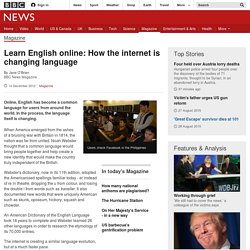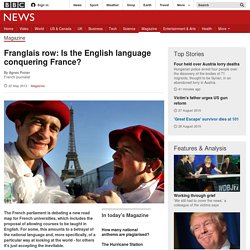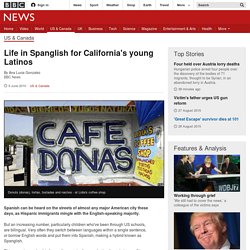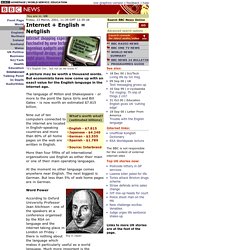

DOCUMENT 1 : Learn English online: How the internet is changing language. Online, English has become a common language for users from around the world.

In the process, the language itself is changing. When America emerged from the ashes of a bruising war with Britain in 1814, the nation was far from united. Noah Webster thought that a common language would bring people together and help create a new identity that would make the country truly independent of the British. Webster's dictionary, now in its 11th edition, adopted the Americanised spellings familiar today - er instead of re in theatre, dropping the u from colour, and losing the double l from words such as traveller. It also documented new words that were uniquely American such as skunk, opossum, hickory, squash and chowder. An American Dictionary of the English Language took 18 years to complete and Webster learned 26 other languages in order to research the etymology of its 70,000 entries. The internet is creating a similar language evolution, but at a much faster pace. Take Hinglish. DOCUMENT 2: English or Hinglish - which will India choose?
26 November 2012Last updated at 19:02 ET By Zareer Masani Writer and broadcaster Today's aspirational Indians want their children to go to a school where lessons are taught in English. But often the pupils leave speaking a language that would not be recognised in London or New York. Could this Hinglish be the language of India's future? Why, half a century after Indian independence, does English remain the language of higher education, national media, the upper judiciary and bureaucracy and corporate business? The answer is that India, unlike its rival Asian giant China, has no truly national language of its own. Even the colloquial Hindustani of Bollywood films is spoken by only 40% of the population, concentrated in the "cow belt" of northern India. The rest of the subcontinent speaks hundreds of regional vernaculars.
Amid this Babel, English remains the country's only lingua franca. Continue reading the main story Hinglish lesson Head is paining A headache Mother serious Mother is very ill. DOCUMENT 3: Franglais row: Is the English language conquering France? The French parliament is debating a new road map for French universities, which includes the proposal of allowing courses to be taught in English.

For some, this amounts to a betrayal of the national language and, more specifically, of a particular way at looking at the world - for others it's just accepting the inevitable. It all started with a faux-pas - to use a French phrase commonly borrowed by English-speakers. On 20 March, when French higher education minister Genevieve Fioraso unveiled the proposed road map, she mentioned that there were only 3,000 Indian students in France.
In order to attract more foreign students, she added, French universities would have to start offering courses taught in English. "We must teach in English or there will only remain in France a handful of experts discussing Proust around the table," she said. DOCUMENT 4: Life in Spanglish for California's young Latinos. Spanish can be heard on the streets of almost any major American city these days, as Hispanic immigrants mingle with the English-speaking majority.

But an increasing number, particularly children who've been through US schools, are bilingual. Very often they switch between languages within a single sentence, or borrow English words and put them into Spanish, making a hybrid known as Spanglish. This group is now too big for media organisations and advertisers to ignore. New ways of broadcasting and marketing products are being developed to target them.
"I talk Spanish at home, except with my brothers, with them I speak English," says Adriana, a teenager at Bell High School in East Los Angeles, California. Internet + English = Netglish. A picture may be worth a thousand words.

But economists have now come up with an exact value for the English language in the internet age. The language of Milton and Shakespeare - or more to the point the Spice Girls and Bill Gates - is now worth an estimated $7.815 billion. Doc1. Doc2. Doc3. Doc4. Doc5.